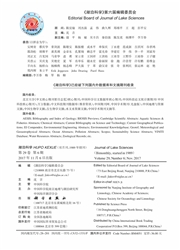

 中文摘要:
中文摘要:
水体富营养化诱发的水生植物衰退机理已成为近年来水域生态学领域的研究热点.本文系统阐明了目前有关水生植物生物力学性能及其对水体富营养化的响应和其在该进程中水生植物衰退过程中的作用等研究进展.现有研究表明水生植物生物力学性能主要包括茎/叶/叶柄的抗拉性能(挺水植物为茎/叶柄的抗弯性能)和根的锚定性能;受水体富营养化主要环境变量(富营养底泥、水体高浓度氮磷和可利用光缺乏)的显著影响且具种间差异;还与生长、形态、生物量分配、组织结构、代谢等其他受水体富营养化显著影响的指标密切相关,且在应对水体富营养化时与生物力学间具有一定的协同作用;此外,生物力学性能受损不仅阻断植株的"生命进程",还严重削弱断枝后植株的资源获取能力和断枝的扩散定植能力,极大降低其适合度.根据野外调查和现有研究结果,生物力学性能的改变的确在富营养化水体水生植物衰退进程中起到关键作用.生态系统是多因子共同作用的综合系统,但目前的水生植物生物力学性能研究主要集中在水体富营养化的3大特征因子,亟需进一步深入系统开展随水体富营养化而改变的溶解氧、藻毒素、食草动物等其他因子的影响研究,以便更加全面真实地诠释水体富营养化造成水生植被衰退的生物力学机理.
 英文摘要:
英文摘要:
The mechanism of the decline of aquatic macrophytes in eutrophic waters has recently become a central and growing interest to aquatic ecologists. Here,we described the biomechanical properties of aquatic macrophytes,their responses to eutrophication and their possible contribution to the decline caused by eutrophication. Different from most terrestrial plants,the biomechanical properties of aquatic macrophytes mainly included the tensile properties of stems/leaves/petioles( the bending properties of stems/petioles for emergent macrophytes) and root anchorage strength. Three vital factors of eutrophication,the fertile sediment,higher concentrations of nitrogen and phosphorus in water-column and limited light availability,had significantly negative and species-specific influences on the biomechanical properties of aquatic macrophytes. Additionally,there were strong relationships between the biomechanical properties and the other aspects,which were also significantly affected on,such as plant growth,morphology,biomass allocation,anatomic structure and metabolism,as well as collaboration between these factors during their response to the eutrophication. What's more,the mechanical damages interrupted the life progress because of a vital reduce in resource acquisition for parent plants and a relative low spreading and colonize ability for all fragments,resulting in a low fitness. Numerous field investiga-tions and laboratory experiments can imply that the changed biomechanical properties do play a key role in the decline of aquatic macrophytes during the progress of eutrophication. As the multiple interactions among the environmental factors existed in natural waters,most studies only focused on the effects of the three vital factors resulted from eutrophication on the biomechanical properties of aquatic macrophytes. Therefore,further and systematical studies should be conducted on the plant biomechanical properties responding to multiply factors( dissolved oxygen,algal toxins and herbivores) because these fa
 同期刊论文项目
同期刊论文项目
 同项目期刊论文
同项目期刊论文
 期刊信息
期刊信息
